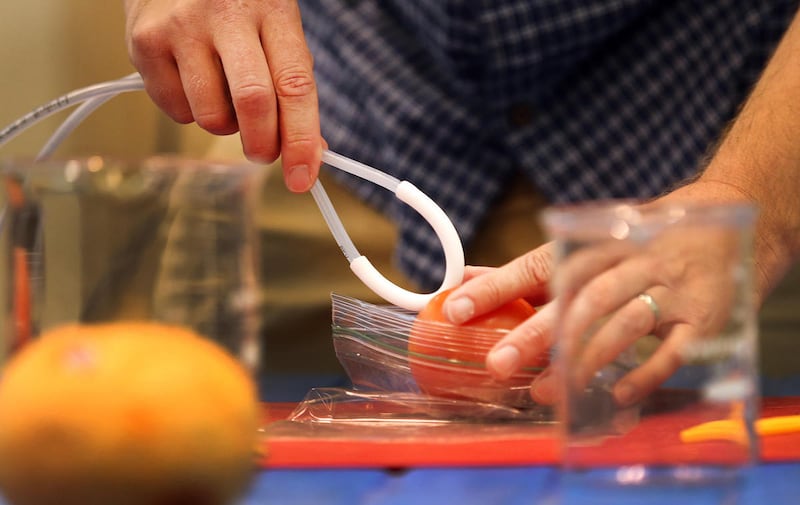SALT LAKE CITY — Juan Diego Catholic High School student Jose Galang carefully inserted a rubber tube into an opening on the side of a bell pepper.
The tube was connected to a larger jumble of tubes next to a tank of nitrogen, a water vapor isotope analyzer and a computer monitor — a wheeled collection of equipment named "the iso wagon."
By measuring the unique signature of isotopes in the water of the pepper, and with the help of a University of Utah researcher, Galang used the humming contraption to show that the pepper was likely grown in Holland, as advertised at the grocery store.
"This experiment sure beats your average baking soda volcano," said Galang, who was joined by other students, teachers and researchers in a hands-on research institute Tuesday as part of the iUTAH project.
iUTAH, or innovative Urban Transitions and Aridregion Hydro-sustainability, is a five-year program funded by a $20 million grant from the National Science Foundation. Now in its fourth year, the program aims to monitor and improve Utah's water usage, inform residents of sustainable practices and educate future water scientists.
Research tied to the project considers issues as large as entire watershed systems and as small as isotopic water molecules in foods and soils.
Erik Oerter, a postdoctoral fellow with the U.'s geology and geophysics department and builder of the iso wagon, led Tuesday's portion of the weeklong research institute.
Comparing isotopes in tomatoes from Mexico, kiwis from New Zealand and apricots from Utah is one way to illustrate how water is exchanged globally. And it's a part of water management that many people don't consider, he said.
"You can move water on the landscape in ways other than inside pipes," Oerter said. "That tomato truck is mostly a water truck."
The research institute includes nine high school students, nine teachers and nine undergraduate college students, as well as university faculty. The group began their hands-on experience Monday by sampling water quality in Emigration Creek.
On Wednesday, they'll examine the social science of water management by surveying Utahns on how they use and appreciate urban streams. They'll compile their findings on Thursday and give poster presentations on Friday at the U.'s Guest House Conference Center.
Among the group is Crystal King, a West High School environmental science teacher. She said Tuesday's experiment, along with other projects this week, are helping her gather ideas for her classroom.
"I was just looking for ideas to connect more with my students and make them more aware of issues affecting us here in the Salt Lake Valley and not to take water for granted," King said. "We take for granted that we'll be able to go to the store and get any fruit or vegetable that we want at any time of the year and that it has to come from quite a ways away."
Louisa Stark, director of the iUTAH Summer Research Institute and the Genetic Science Learning Center at the U., said one of the intended outcomes of the program is to bring research institutions together in finding solutions to water management in the state. Those institutions include the U., Utah State University and BYU.
Cultivating interest in water sciences among prospective scientists is another key to providing long-term solutions, she said.
"Our goal is to introduce the participants to these different kinds of water research that are going on in hopes that they might become interested in pursuing a career that's related to water, that they'll become more informed citizens," Stark said. "Reaching teachers is a really effective way to reach students."
Galang said the project has been eye-opening, though he's still planning to major in mechanical engineering when he goes to college. But having high school students, their teachers, college undergraduates and university faculty all work together for a week has other benefits, even if students choose to study something else.
"We have mentors, especially science teachers and college kids, who are doing some of these research studies," Galang said. "It's good to have a little help because I'm only a junior in high school."
Email: mjacobsen@deseretnews.com
Twitter: MorganEJacobsen











